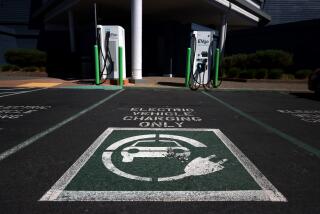Lead Batteries More Polluting, Researchers Say : Cars: Auto industry welcomes study’s results. Environmentalists hotly criticize the findings.
- Share via
Electric cars using lead-acid batteries could dramatically increase lead pollution in the country and set back a decades-long effort to eliminate the toxic substance from the environment, according to a study by three researchers for Carnegie Mellon University in Pittsburgh.
Over their life cycle, from manufacture to recycling, even improved versions of existing lead-acid batteries would result in the release of several times as much lead into the air as automobiles powered by leaded fuel, now banned in the United States, according to the study.
Lead-based batteries have long been a concern of both proponents and critics of electric cars, but no research had yet produced such dire predictions about the possible impact of lead-acid electric cars.
Including all lead released during mining, smelting, recycling, manufacture and use of the batteries, the report says, electric cars likely to be marketed in 1998--California’s deadline for big auto makers to market the first zero-emission cars--will release 60 times more lead per mile than a car burning leaded gasoline.
Even batteries on the drawing boards that would use much less lead would release five times as much as a leaded-gasoline car, the study found.
The study was welcomed by the auto industry and others who oppose California’s zero-emission vehicle mandate, but it was hotly criticized by environmentalists and battery experts. The study, first disclosed Tuesday in the New York Times, will appear later this week in Science magazine.
“It was a relatively straightforward thing to look at the electric vehicle . . . “ “ said Francis Clay McMichael, a professor of environmental engineering at Carnegie Mellon and one of the researchers.
McMichael said he has researched pollution from batteries since 1989 and that the study was funded indirectly by the National Science Foundation, AT&T; Foundation and IBM Corp., none of which had an interest in its outcome.
But Alan J. Krupnick, senior fellow at Washington-based Resources for the Future, said the study used unrealistically low ranges for electric cars and overly high mileage for gasoline vehicles to come up with such a dramatic comparison.
Jack Guy, manager of commercialization at the Palo Alto-based Electric Power Research Institute, questioned the study’s assumptions about pollution-control.
“You can build lead-acid batteries with zero emissions,” Guy said. “Electrosource (batteries), my project, is as clean as a clean room.






